🌱 Nature is a marginalized voice, too
On de-centering humans and sharing our grief and wonder in community
Welcome new subscribers! I’ve been energized by our thoughtful exchanges over the past week. Today, I’d like to give a special shout-out for the Substacks of my very talented writer friends IRL,
, , and .1 I’m delighted to know they’re here getting well-deserved love from the Substack community.Last week’s post about the “Nature Is Speaking” campaign prompted some lively comments.
“Nature is forgiving, compassionate and hopeful - there are so many people doing good work, and more all the time.”
“I'm 100% behind recognizing that humans are part of nature and that we need to live with less destruction and consumption of the world, to view nature as having intrinsic value beyond human needs.”
“I think casting anyone/ anything in the role of the disapproving, authoritarian other robs us of agency.”
“I love and wholeheartedly agree on your take on our relationship with nature. I think you are hitting on the fundamental shift that is needed at this juncture in history.”
Announcements
You’re all invited to the (virtual) Summer Solstice nature writers housewarming party on Thursday, June 20! That’s the day Vol.1, No.1 of the NatureStack Journal will be published. I’ve been quietly gathering pieces to feature. If you would like to call my attention to an essay, poem, or work of art you’ve seen lately—either by you or another—please link to it in the comments.
The interview series of Substack’s best nature writers starts in July. Based on the ones I’ve received so far, it’s going to be very moving and inspiring! Let me know if you’re interested in participating.
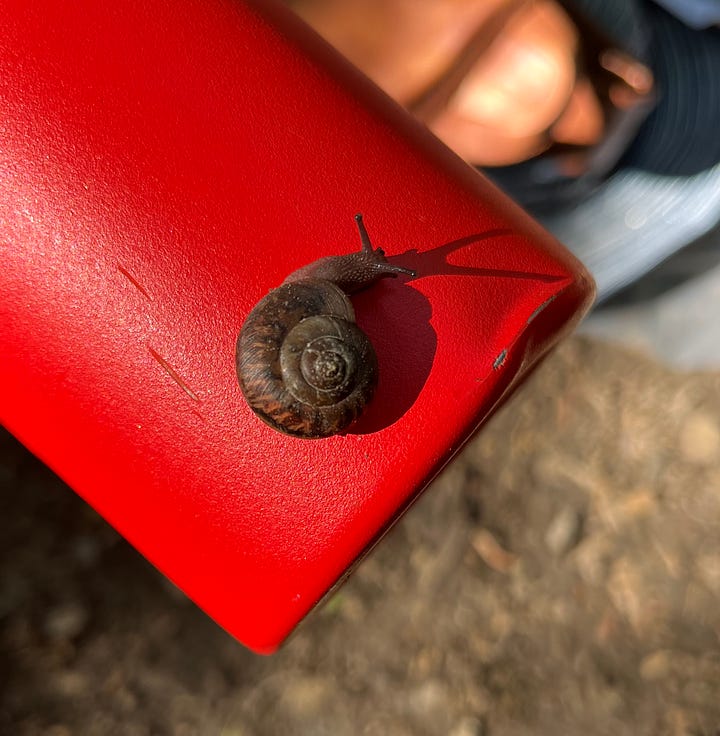
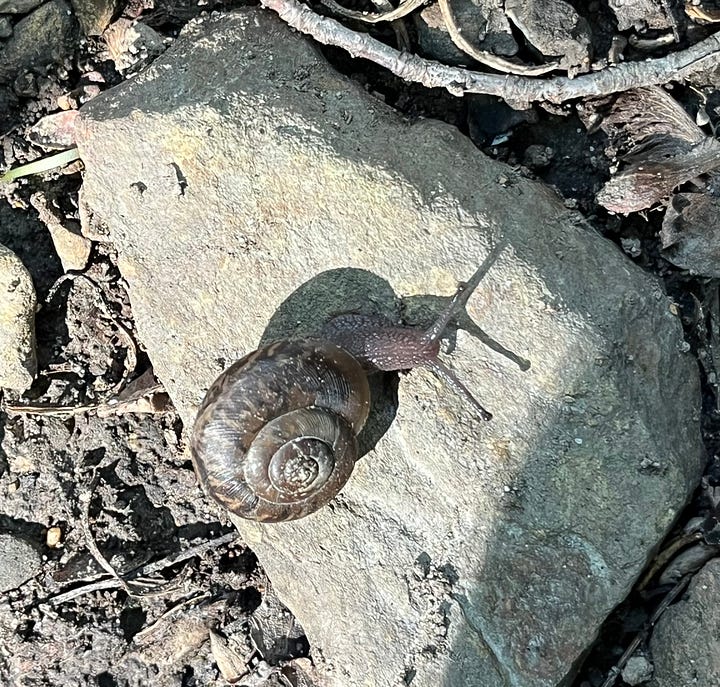
Nature is speaking, the eco-centric version
In last week’s post, I proposed an alternative to Conservation International’s depressingly patriarchal video series, “Nature Is Speaking.” With far better things to do than put us in a toddler time-out, nature is a mysterious, all-loving and infinitely creative force and, as part of nature ourselves, we too have that potential and that capacity.
A while back, Paul Kingsnorth wrote an essay that set off a persistent longing in me. It was like receiving a divine assignment. In it, he asks why fiction so rarely extends imagination beyond the human realm. We would have to set aside the modern story of a mechanical nature in which only humans have consciousness. Instead, consider that the rest of the world is as alive and aware as we are, which has been the understanding for most of human history.
“I wonder what our writing would look like if we took this notion seriously; in particular, what our fiction would look like. That the world is a machine is one story; that the world is alive and aware is another. The latter story has probably been taken for granted by the majority of human societies throughout history. The former has only really taken root in ours: post-Enlightenment, industrial western culture. The results of it – climate change, mass extinction, factory farming – should be enough to make us wonder if this story is badly constructed, badly told, or just plain wrong. . . . The same society that gave us the concept of the world as an inanimate backdrop to human activity gave us the novels which catalogued that story.”2
It’s a fertile time for writing, as previously marginalized voices find eager audiences.3 The many beings in the other-than-human world might also be considered marginalized voices. After all, the modern view of human exception and superiority has given us all the stuff Alan Weisman wrote about in his excruciating book, The World Without Us (see below). No wonder we are awash in dystopian fiction.
Children’s books, science fiction, and fantasy have no problem with expanding POV beyond the human. Why not literary fiction? It feels very important to me that this other-than-human consciousness be taken seriously in all art forms. Because it is real.
“There are people who think that things that happen in fiction do not really happen. These people are wrong.” ~ Neil Gaiman
One of difficulties in attempting to voice the living world is the problem of language itself.4 My encounters in the forest or on the water are worldless. They involve going to a place, being still for long stretches and opening my senses wide. To listen. To observe. To touch or taste or smell. To feel into the sensation of being heard, of being seen, touched, tasted, or smelled in return. To be known. These experiences go straight into my body through my heart. Finding words to express those images and emotions is nearly impossible, but that doesn’t stop me from trying.
Another dilemma is the utter presumptuousness of it. Who says nature needs to be rendered in human language? My inner skeptic wants to know how it helps anything to converse with a maple tree. What impact will listening to a garrulous mountain stream have on the PPM of CO2 in the atmosphere? And yet, insisting on measure as a gauge of value is part of the old hierarchical, overly rational mindset that got us into this mess.
Humans are storytellers. We not only entertain and make meaning; we create reality by the stories we tell. I am with Kingsnorth; there is room for stories that dare to venture beyond the human-centric gaze.
“Most classic novels in the western canon are examinations of the human psyche, or the relationships between small groups of people and their societies. They are studies of the individual human mind. But what about the mind of the world itself? If awareness, consciousness, feelings – life – all extend far beyond the human domain, why do novels continue to behave as if humans were the only actors? Why do we turn over the same exhausted soil again and again? What would a novel look like if it were written by someone who sang to the forest, and believed it sang back?”
In my limited experiences, these encounters are both connection and welcome, a blessing on my return after so long an absence. And an invitation to share the gifts of belonging and kinship with the rest of the human community.
The stories I’m working on explore POVs of other-than-human individuals. A heron beguiles a man terrified of water. A house observes a group of people brainstorm utopia while prioritizing human needs. A maple tree appeals to a young girl to prevent the violent destruction of their home.5 A cynical water spirit (naiad) pins her remaining hopes a spoiled teenager who makes a surprising choice.
These beings have their own agency. Our interdependence with them can mirror the mistaken ways we continue to pursue while awakening our conscience and compassion. Their wisdom is all around us, if only we will listen and heed their warnings and advice.
But wait! Humans still suck, don’t they?
Trigger warning: this gets pretty dark before it emerges back into the light. I’ve been listening to this awful truthful book, The World Without Us, by U.S. journalist Alan Weisman. Published in 2007, the premise is, what would happen if people were to suddenly, but not catastrophically, disappear? How would the earth recover (or not) without our constant pressures and self-imposed stewardship—often of places so severely damaged, they need our constant monitoring and attention just to keep them from getting worse? Enough readers were intrigued by the premise, it became a best seller.
I’m one of those people who almost without exception sticks with a book to the bitter end. The author put a lot into writing it, the least I can do is finish. But this one taxed me. It hurts my heart. I’ve muttered more than once, “We suck!” Every time I listened to another chapter, my face crumpled into Mom’s mad again, give her a wide berth.
Spoiler alert: it’s not the picturesque decline you might imagine, like vines pulling down an abandoned barn or the overgrown hedgerows in a
Note. I may have already been at a low ebb, but this book was relentless and depressing. A more accurate title would’ve been, The World With Us, because he reports on the state of every ecosystem and industry, every human civilization and flora and fauna population, from prehistory to the recent past, the present, and speculatively, into the future.There is nowhere we haven’t fucked up with better living through chemistry, farming as warfare, bird-murdering highrises, terraforming, silted-up dams, loosely buried nuclear waste, hellscape plastic factories, power lines, asphalt, chlorofluorocarbons, logging, exotic species—and these are just off the top of my head. Our fixes for these messes cause messes of their own, requiring fixes for those messes, and (to quote Kurt Vonnegut) so on.
The litany of places and ways we’ve screwed up is mind-boggling. It’s as if humans were assigned this special task at our creation: Here is a fully functioning, complex, creative, marvelous miracle planet. Feel free to adapt and find your place; then move on to conquer lands and people; exploit every animal, mineral, plant and water body you encounter; invent new chemicals never before imagined; burn; dig; crush; pulverize; bury; excavate; enslave; imprison; endanger; crack and break; desiccate; flood; build power plants that burn the guts of shattered mountains; and invent a new kind of power plant that requires radioactive fuel with a half-life in the six figures. And do all that at an ever-accelerating rate with a sense of entitlement and true belief in your correctness and superiority. And . . . go!6
It's been a while since I stared into this evil abyss. It made me want to gouge my eyeballs, tear out my hair, rend my garments. I wondered about Alan Weisman. I mean, what is his deal? I imagined being seated next to him at a dinner party. Someone across the table remarks on the lovely birdsong that evening and here he comes with his facts and stats about just how many of them the host’s housecat has killed that year. Then he starts in talking up his new book, Countdown: Our Last Best Hope for a Future on Earth? Oh, joy. Excuse me while I go add that to my wish list.7
In fairness, the author’s afterward on the audiobook was recorded by Weisman himself, appreciating the many hardworking, dedicated scientists, engineers, researchers, activists and other experts that he interviewed, from Europe to the South Pacific, from Antarctica to the Arctic Circle to New Mexico, over four years. He clearly cares and wants everyone to know what’s up.
I put the book down and immediately spent a weekend surrounded by more than a thousand acres of mountain forest between the Appalachian Trail and the Shenandoah River. I was not in a good place when I arrived. Fortunately, at these heroine’s journey retreats, we drum and do Sacred Circle Dance and wander among the marvelous beings who are welcoming and mysterious in perfect measure.8
Dancing to this song was a transcendent experience.
I was cracked open and reminded of the joys of being alive and awake, even at this time. Being awake hurts. It hurts a LOT. Fortunately, I was also reminded that I’ve been trying to muscle my way through, to carry all that grief and worry alone. No wonder I was so exhausted.
This grief I feel is not meant to be a personal grief. Rather, it’s a recognition of my connectedness to all who live and suffer. There is so much to grieve in the world, but alone and isolated is not the way to do it. Grief is meant to be shared. It’s a collective sacrament of entanglement and descent. It reshapes us as a community and prepares us for the work ahead.
More fiction coming!
I’m inspired by
, who recently committed to prioritizing her fiction. For me, fiction takes exponentially longer to write and revise, so I haven’t yet found the right rhythm here. But two new stories are out or coming soon:My flash fiction piece, “Mr. Jenson,” came out on
last weekend. It isn't often that I'm able to tell a story in 700 words. I tend to get over-invested in the research and agenda, in describing the setting just so, in characters’ elaborate backstories and motivations. On precious rare occasions, it comes together.For next week’s post, I’m participating in
’s Alice Munro Virtual Memorial project. I’ll send out part 1 of “Thirst,” the story of that cynical naiad who has serious authority problems and is also a touch homicidal.Thanks for reading! Have you had any soul-restoring encounters with wild creatures? Or danced for the trees?
If you enjoyed this post, a lovely little 💚 keeps me going. For more like it, please consider becoming a free or upgrading to paid subscriber. Another way to show love is to share this post with others by restacking it on Notes, via the Substack app. Thanks!
Check them out at Crooked Roots, Sea Cow, and Healing From Within
The article, in The Guardian, from 23 July 2016, 'We imagine how it feels to be a character, why can't we imagine how the land feels?' is here.
Here on Substack, Unlocked | BIPOC Reads will feature the work of BIPOC writers from the Locked In community.
I wrote about this for The Books That Made Us, choosing Brian Doyle’s wonderful book, Mink River, in a post called, Writing the Immeasurable
“Heartwood” was originally published in 4 parts, which is where the conversation is. The full version is here. It’s about a 30-minute read.
The poet Rainer Maria Rilke has a far different take on this that I much prefer:
Go to the limits of your longing
God speaks to each of us as he makes us,
then walks with us silently out of the night.
These are the words we dimly hear:
You, sent out beyond your recall,
go to the limits of your longing.
Embody me.
Flare up like a flame
and make big shadows I can move in.
Let everything happen to you: beauty and terror.
Just keep going. No feeling is final.
Don’t let yourself lose me.
Nearby is the country they call life.
You will know it by its seriousness.
Give me your hand.
Translation by Joanna Macy and Anita Barrows
I know, I know, he’s only the messenger. Trying to warn us as best he can.
If you’ve never done Sacred Circle Dance, I can’t recommend it enough. These ancient patterns from world cultures pay homage to the earth and are incredibly healing. My friend Lisa Bardack offers workshops in the Maryland-D.C. area, but you can find them all over the world.





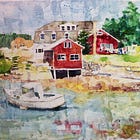
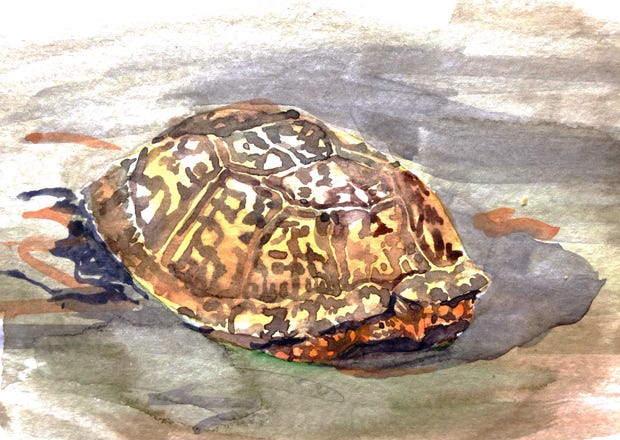
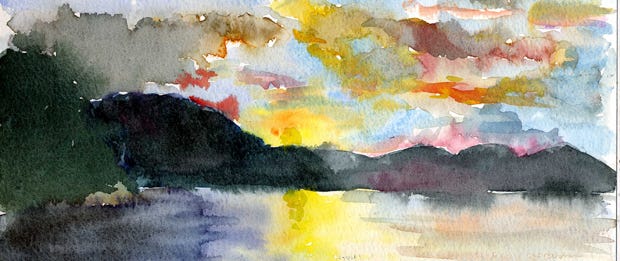

Dearest Julie, I feel that you and I are walking a very similar path right now. Investigating questions and considering our own placement in the findings. I mention Weisman in a story, "Alan Weisman, in The World Without Us, spends a chapter (probably the best chapter of the book) talking about the brevity of time necessary for nature to reclaim." The book is a hard read but what I really like about it is that in the end, we won't be here. Our species will destroy itself but there is something rewarding that decades, eons, times we cannot even fathom, this "big, massive ball hurling through a planetary neighborhood" (that being used in my next post) will get on without us. What we have to do, as individuals, is share that there is a community worth spending time getting to know and value. What we have to understand is that our being here is of a time so very short. Does it hurt? Absolutely. What can we do? Share stories that make an impact.
I feel all of this. Go Julie! Showing us one way to transmute pain and grief into action.